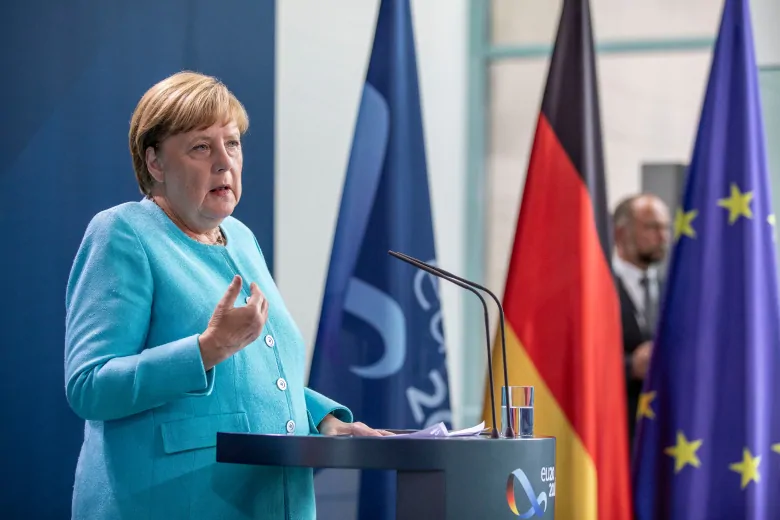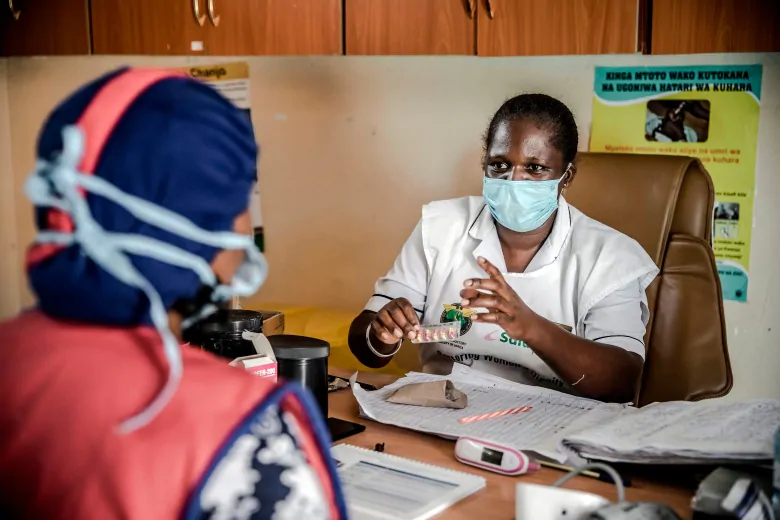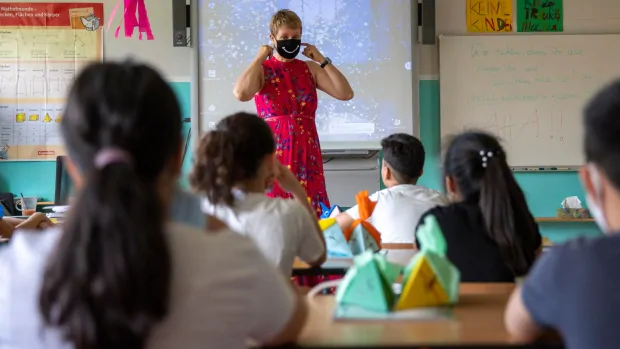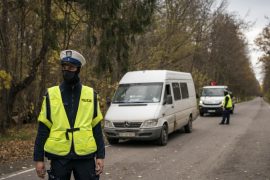The latest:
- Berlin schools report COVID-19 infections less than 2 weeks after classes resume.
- Mass testing of residents for coronavirus to start in Hong Kong, leader says.
- Kenyan doctors go on strike over delayed salaries and lack of personal protective equipment.
- New $37B COVID-19 aid package extends CERB, expands EI and adds ‘recovery’ benefits.
At least 41 schools in Berlin have reported that students and teachers have become infected with coronavirus not even two weeks after schools reopened in the German capital.
The daily newspaper Berliner Zeitung published the numbers Friday, and city education authorities confirmed the figures to The Associated Press.
Hundreds of students and teachers are in quarantine, the newspaper reported. Elementary schools, high schools and trade schools are all affected, the paper wrote. There are 825 schools in Berlin.
The reopening of schools and the possible risks of virus clusters building up in educational institutions and then spreading beyond to families and further into society have been a matter of great concern, and it’s an issue that’s hotly debated in Germany.
Education in Germany isn’t in the hands of the federal government but under the auspices of the country’s 16 states, and thus there are many differing COVID-19 rules in place depending on each state, especially when it comes to wearing masks. While some states are still on summer vacation, others have been back to school for about two weeks.
German Chancellor Angela Merkel expressed criticism Thursday that there are too many different regulations in place across the country, saying “people simply don’t understand” why they’re allowed to do one thing in Berlin that may be banned in Bavaria. However, plans are underway to harmonize the different COVID-19 rules and come up with regulations that apply all over the country.
Berlin was one of the first places in Germany to reopen its schools after the summer holidays. Children are obliged to wear masks in the hallways, during breaks and when they enter the classroom, but they can take the masks off once they sit in their places and classes begin. Some critics say the measures in Berlin are too relaxed, and both students and teachers should wear masks during lessons as well.
WATCH | Flu cases could tumble in Northern Hemisphere says infection control specialist:
Such is the case in the western state of North Rhine-Westphalia, Germany’s most populous, where about 2.5 million students went back to school a couple of days after Berlin. No exact figures about the number of schools with coronavirus infections were available from North Rhine-Westphalia, but several schools have also had to close classes there because of COVID-19 cases.
In general, Germany is determined to not send schools back into a lockdown as was the case in March, even as the infection rates go up again. Schools have been ordered to send single students or classes that had possible exposure into quarantine, but the goal is to avoid shutting down entire schools.
The German government has also said that keeping schools open is a top priority and more important than bringing fans back to sports stadiums or allowing big crowds to gather for concerts and other mass events.
Coronavirus case numbers in Germany have been going up again since late July. The re-emergence of the virus in the country is driven by travellers returning home from abroad and people gathering for social events.
What’s happening with coronavirus in Canada
As of 5 a.m. ET on Friday, Canada had 123,873 confirmed and presumptive coronavirus cases. Provinces and territories listed 110,288 of those as recovered or resolved. A CBC News tally of deaths based on provincial reports, regional health information and CBC’s reporting stood at 9,090.
The federal government is extending the Canada Emergency Response Benefit (CERB) by one more month and revamping the employment insurance program to allow more people to receive financial assistance during COVID-19.
The suite of benefit reforms, aimed at helping Canadians through the transition as the economy gradually reopens, is expected to cost $37 billion.
WATCH | $37B aid package includes CERB extension, new benefits:
Measures include greater flexibility on the work hours required for EI, making it easier for people to qualify for a one-year period.
Deputy Prime Minister and Finance Minister Chrystia Freeland and Employment Minister Carla Qualtrough announced the new measures during a news conference in Ottawa on Thursday afternoon.
“We’re doing our very best to support all Canadian workers and leave no one behind,” Qualtrough said.
CERB, which has already paid out more than $69 billion to more than 8.6 million recipients, will now be in place until Sept. 27, extending the program from six months to 28 weeks.
Here’s what’s happening around the world
According to Johns Hopkins University, the global total of confirmed coronavirus cases is now more than 22.6 million. More than 794,000 people have died, while 14.5 million have recovered.
Doctors in most public hospitals in Kenya’s capital went on strike Friday to protest against delayed salaries and a lack of personal protective equipment (PPE) when handling patients who may have COVID-19.
The strike began at midnight on Friday, said Thuranira Kaugiria, secretary general for the Kenya Medical Practitioners, Pharmacists and Dentists Union.

He said 320 doctors employed by the Nairobi County government were taking part in the strike because they had inadequate health insurance, poor quality PPE and too few isolation wards to treat COVID-19 patients.
Hong Kong leader Carrie Lam said on Friday that mass testing of residents for coronavirus in the Asian financial hub will begin on Sept. 1, as she warned people not to be complacent despite a steady fall in the number of new infections.
The testing, which will be done with the assistance of a 60-person team from the mainland, is the first time Chinese health officials have assisted the special administrative region in its battle to control the pandemic.
Venezuela’s opposition said on Thursday the United States has granted it access to millions of dollars of frozen Venezuelan government funds to support efforts to combat the spread of COVID-19 in the country.
WATCH | Saliva tests could change COVID-19 but not in Canada yet:
The U.S. Treasury Department had approved the release of the funds, the opposition said in a statement without specifying the total amount.
The statement said part of the released funds would go to pay some 62,000 health workers $300 US each. During a live appearance on Twitter on Thursday night, opposition leader Juan Guaido said health workers could register accounts to receive payments of $100 a month starting Monday.
Myanmar, also known as Burma, has locked down the state capital of conflict-torn Rakhine after an outbreak of a coronavirus strain that officials said was more infectious than that previously seen in the country.
Nineteen people have tested positive for the virus in the western region since Monday, health officials said on Friday, the first local transmission in Myanmar in months, bringing the total number of cases to 409.

Myat Htut Nyunt, deputy director at Myanmar’s department of medical research, said the type of virus was the same as a mutation detected earlier this week in Malaysia, which has been found in Europe, North America and parts of Asia, and is thought to be more infectious.
Poland reported 903 new coronavirus cases on Friday, according to the Health Ministry’s Twitter account, the highest daily increase since the pandemic began.
The new record comes days after the health minister resigned and as Poland braces for the new school year starting on Sept.1.
The Health Ministry data showed the biggest increase in the south of Poland, including the mining region Silesia, which has been hit hard by the COVID-19 crisis as many miners caught the disease and mining operations were closed.
South Korea has reported 324 new cases of the coronavirus, its highest single day total since early March as the recent surge of COVID-19 in the greater capital area now appears to be spreading nationwide.
Friday was the eighth consecutive day that South Korea has reported a triple-digit daily increase, for an eight-day total of 1,900 infections.
Most of the recent new cases have been in the densely populated Seoul metropolitan region. But officials said Friday the latest new infections were recorded in practically all major cities nationwide.

Introvert. Proud beer specialist. Coffee geek. Typical thinker. Pop culture trailblazer. Music practitioner. Explorer.





